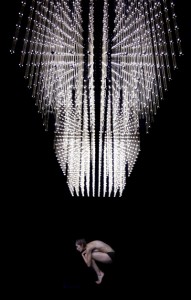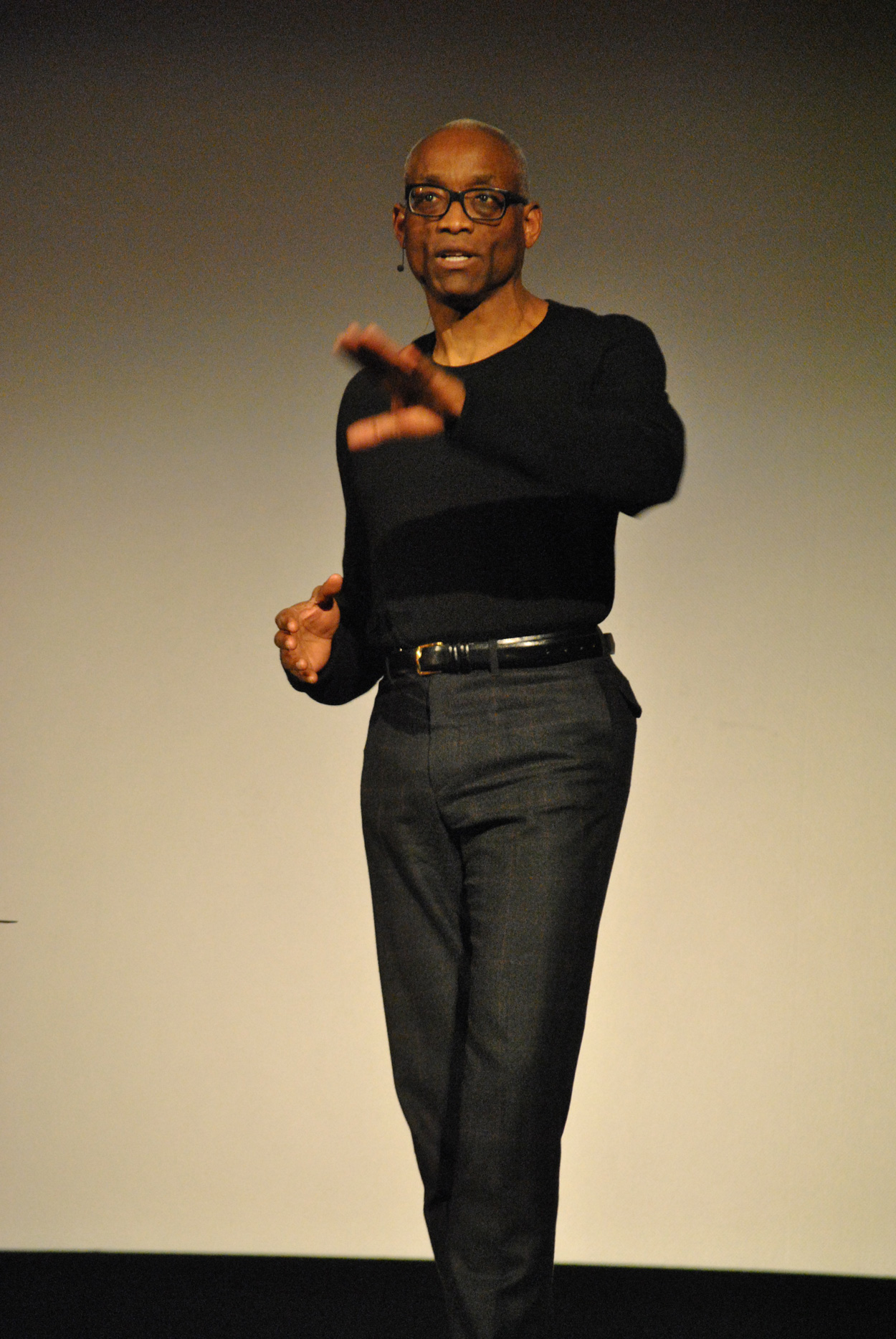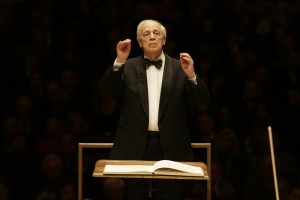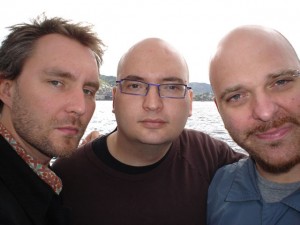Renegade Series will shake up your mud months
Some renegades: 1. Einstein on the Beach and 2. Random Dance.
A friend from Minneapolis was visiting earlier this summer, and we got to talking about the dreaded “mud months” up here in the icy north—February, March, alas, even April. Our friend mentioned that she’d spent a week in Arizona last February, but when I said I envied her, she shook her head. “Actually,” she said, “I cut my trip short. I couldn’t wait to get back.”
“What made you do that?”
The cultural life, she said. “There’s no cultural life down there.”
With apologies to the Heard Museum and Ballet Arizona, I think she’s got a point. And I’ve promised myself that this year, no matter how bad it gets, I’m not going to complain when it’s mid-March and I’m shoveling snow for the third time in a week, because the cultural offerings in Ann Arbor more than compensate. (Of course nothing about winter seems bad right now, so long as there are no mosquitoes.)
I’m actually looking forward to the mud months of 2012, because that’s when UMS—in what’s either a brilliant move or a potentially ruinous gesture of faith in the weather gods—is presenting its Renegade series. For me it’s the most tantalizing thing on offer this season, and I’ll be tracking it here on the Lobby, hoping to answer some of the questions I’ve long had about the process of art and art-making, and what makes some artists true outposts of genius and others mere followers. The series starts in January with a reconstruction of the 1976 opera Einstein on the Beach and winds up in late March with the San Francisco Symphony’s “American Mavericks” series, and in between covers a wide and intriguing arc of genres and eras. Beethoven, Gesualdo, Robert Lepage, Jessye Norman, Meredith Monk, Robert Wilson, Philip Glass—they’re all part of it, and they’ll all be here, in spirit or person, as we hunker down under Michigan’s gray skies and count the days until the crocuses bloom.
Because he has as much to do with the evolution of this series as anyone on the planet, I’m starting my personal Renegade “journey” with UMS Programming Director Michael Kondziolka:
LS: What’s the genesis of the Renegade series?
MK: I’ve been having a conversation for 10 years about Einstein on the Beach. And I was also having a conversation with the San Francisco Symphony about a remount of their American Mavericks festival—the first one they did was 10 years ago, in San Francisco. Both of these conversations were long-term and ongoing. And there was a moment when I realized, “Huh! It appears that both of these projects are going to land in the same season.” And when I realized that, I started thinking about the commonalities.
The American Mavericks festival is really all about Michael Tilson Thomas’s vision for a certain kind of American sensibility and “mavericky-ness” when it comes to orchestral music composition—what it means to be American, and what it means to be an innovator and an experimenter. And how can that not in some way relate to Einstein on the Beach, which is, of course, an American work of music, theater, or opera that very much embodied those same ideas of risk-taking, innovation, scale, in creating something really new.
That, strangely enough, collided with another moment that I had last season, where I’m sitting there listening to Pierre Boulez talk about his life, his ruminations on the 20th century, and his role in that. And a student asked a really wonderful question about what the new electronically based media means for music and composition. And Boulez said, “Je ne suis pas un prophète.” “I’m not a prophet. ” And he started to expound on artistic works that are truly important, that are game-changers—works we could never, ever have possibly anticipated, and once we’ve experienced them, could never imagine living without. This was his definition for something that’s truly important.
And I guess it was that statement from such an important intellectual, about art and culture, and these two projects that were long-term conversations, coming together and forming the possibility of a thread of performances devoted to this idea of work that really has changed the direction of the form.
LS: I like the term “game-changers.”
MK: It also felt very zeitgeisty to me. That these things came together at a time when our popular discourse, and our popular political discourse, is just polluted with vocabulary about innovation. “Innovating our way out of the difficulties that we face today.” “Being a maverick.” “I’m the real maverick.” All of this bullsh!t that’s kind of like wallpaper, but there’s no real there there. And of course there are lots of examples of real mavericks, of people who are really innovating, but it also seems kind of … cheap. We’re cheapening the meaning of some of these ideas, of what it means to be a real change-agent.
LS: Why “renegade”?
MK: Ultimately we wanted to choose a word that hasn’t been overused, a word that maybe made people feel both a little bit curious and a little bit uncomfortable. I like the word, because it toggles between the artists, their artistic output, and the audience. What does it mean if you’re an audience member who chooses to go to these sorts of events? Are you a little bit of a renegade? Are you taking a risk? How do you feel about taking that risk, and what do you get out of taking that risk? As consumers of the arts—as listeners and observers—it is the moments when we take risks, or step into something that we have no idea what it is, and are completely bowled over and changed, that matter. Period.
LS: In an ideal world, what do you hope audiences might take away from this?
MK: In a dream world, I want the takeaway to be something really simple. I want people to leave the experience with some sense of that quality of innovation, or change-agency, or specialness, that defines the work as part of this series.
LS: You start with a bang—Einstein on the Beach—and end with another bang, the San Francisco Symphony’s Mavericks series. So how did you decide to flesh out the middle?
MK: How did I want to fill in that time between those two bookends (which is what we’re calling them)? The one thing that was really important to me was that it not focus only on work of the last 50 years. I didn’t want this to feel like a quote-unquote contemporary music series. I wanted to tell a much larger story about moments of extreme change. So I asked Peter Phillips of the Tallis Scholars to put together a Renaissance mavericks program. And we’ve included the Hagen String Quartet’s all-Beethoven concert as a wonderful way of creating an opportunity to understand how Beethoven really changed classical music aesthetics. That’s an obvious concert to include in a series like this. I think Beethoven’s the ultimate maverick.
LS: Beyond just having an interesting cultural experience, and coming away saying, “Wow, I was there for that,” does a series like this have the potential to change our culture by changing the audience? In the best of all possible worlds, how might this shake people up? What might they get from this that goes beyond just the bragging rights, and the curiosity factor?
MK: Obviously, if entering into an unexpected experience opens those kinds of ideas up in an audience member’s mind, that for me would be a very important, possibly transformative takeaway—because we’re reminded, ultimately, of the intrinsic value of the arts and not just the instrumental value of the arts. Now: is that any different from the experience I want people to have when they go to the all-Brahms program with the Chicago Symphony? Probably not.
LS: It does seem that when you’re packaging this as “renegade,” you’re focusing on the process of creating this art, rather than just, “Let’s go hear these great works that are part of the canon.” I mean, how did they get to be part of the canon in the first place?
MK: Exactly.
LS: And what does that mean for us, and how and where we need to move our culture forward?
MK: That’s right. I think you’re right. I also think that accessing a lot of work really ultimately has everything to do with giving yourself permission. Einstein on the Beach, for example, is a five-plus hour work without an intermission …
* * *
In my next post: More from Michael Kondziolka on Einstein on the Beach.
What do you think? Do renegade works fill audiences with renegade spirit? Have you attended a ‘renegade’ work?
UMS’s Arts Round-Up: July 16, 2010
 Many members of the UMS staff keep a watchful eye on local and national media for news about artists on our season, pressing arts issues, and more. We thought we’d pull together a list of interesting stories each week and share them with you. Welcome to UMS’s Arts Roudup, a weekly collection of arts news, including national issues, artist updates, local shout-outs, and a link or two just for fun. If you come across something interesting in your own reading, please feel free to share!
Many members of the UMS staff keep a watchful eye on local and national media for news about artists on our season, pressing arts issues, and more. We thought we’d pull together a list of interesting stories each week and share them with you. Welcome to UMS’s Arts Roudup, a weekly collection of arts news, including national issues, artist updates, local shout-outs, and a link or two just for fun. If you come across something interesting in your own reading, please feel free to share!
National Issues
- Feeling a little less creative? You’re not alone, as a new study shows a dramatic decline in creativity among US citizens.
- The Big Read just got a lot smaller, as the NEA slashed funds to the nation’s largest book club program.
- Can you carry a tune? Here are two new reasons to sing. First, putting words to music appears to dramatically help stroke patients who have lost speech skills recover. Second, singing together encourages cooperation. Looks like Maria Von Trapp got it right with those kids!
- Remember Gustavo Dudamel’s rise to fame through Venezuela’s El Sistema? A group of hand-picked music educators on fellowship at the New England Conservatory is now attempting to bring its principles to the US with El Sistema USA. Here’s the first in a series of articles and videos about the incredible phenomenon.
Artist Updates & New Companies to Watch
- Rumors abound that Pierre Boulez may be writing an opera based on Samuel Beckett’s Waiting for Godot.
- Simon McBurney’s A Disappearing Number disappeared from Ann Arbor nearly two years ago, but it’s been found again — at the Lincoln Center Festival this weekend, and coming to a theater near you as part of the National Theater of London’s live broadcast series this fall. Stay tuned for an announcement about a local screening…
- What’s that up in the sky? It’s a bird, it’s a plane, no…it’s Ameba Acrobatic and Ariel Dance.
Local Shout-Outs
- Congratulations, Ann Arbor! Our college town was noted as a “mecca of arts and culture” as it was named one of CNNMoney’s top 100 best small cities in which to live.
- The annual Ann Arbor Art Fairs run next Wednesday-Saturday, and the line-up of live music has been announced. Check out the performers on the lawn outside our offices at Burton Tower and the Sesi Mazda Ann Arbor’s 107one stage on South University.
- Detroit’s 17th annual Concert of Colors, an free festival of international music, takes place this weekend at the DIA and the Max. A complete line-up was announced by the Detroit Free Press earlier this week.
Links: UMS in the News
Since the beginning of January, we’ve had a busy and exciting 8 weeks of 12 performances in all the big genres: dance, jazz, world music, classical music, and theater. It’s definitely a whirlwind experience for all of us on staff to see and talk about so many events – and there’s definitely been plenty to talk about! In case you missed it, here’s a roundup of UMS in the news:
- Chris Azzopardi of Between the Lines interviewed Bill T. Jones about his motivations for creating Fondly Do We Hope…Fervently Do We Pray and what’s next for his company.
- James Leonard of the Ann Arbor Observer speculated about UMS’s 10/11 season and which orchestra would join the UMS Choral Union in Mahler’s Symphony No. 8 “Symphony of a Thousand” (it’s the DSO, in case you haven’t heard yet!).
- UMS was awarded a share of a $1.9 million dollar grant from the Mellon Foundation to support classical music programming, along with Cal Performances at the University of California-Berkeley and the Krannert Center for the Performing Arts at the University of Illinois in Urbana-Champaign.
- Two of UMS’s very own staff members boldly journeyed into the blogosphere as guest bloggers. UMS Director of Programming Michael Kondziolka blogged at ArtsJournal.com on how artistic programs are chosen and what makes an artist special. UMS Director of Marketing and Communications Sara Billmann blogged for the American Orchestras Summit on the future of orchestral music.
- Susan Nisbett of AnnArbor.com reviewed Fondly Do We Hope…Fervently Do We Pray which created some conversation in the comments section.
- Mark Stryker of the Detroit Free Press interviewed legendary conductor Pierre Boulez on the occasion of his 85th birthday, and in conjunction with the Chicago Symphony Orchestra’s Ann Arbor performance.
- Have you heard of Concentrate? Managing Editor Jeff Myers has been writing fun, quirky, and media-rich profiles of UMS events for a while — and they’re really fantastic. If you’re having a hard time convincing your friend to go to a performance with you, Concentrate is just what the doctor ordered. Check out past profiles on Ladysmith Black Mambazo, The Bad Plus, and the Luciana Souza Trio.
- UMS’s exclusive backstage video with jazz trio The Bad Plus was featured on AnnArbor.com. Don’t miss the honey bear (that’s all I’m gonna say).
- Other AnnArbor.com reviews included Bela Fleck: The Africa Project, the Swedish Radio Choir, and the Schubert Piano Trios (with David Finckel, Wu Han, and Philip Setzer).







